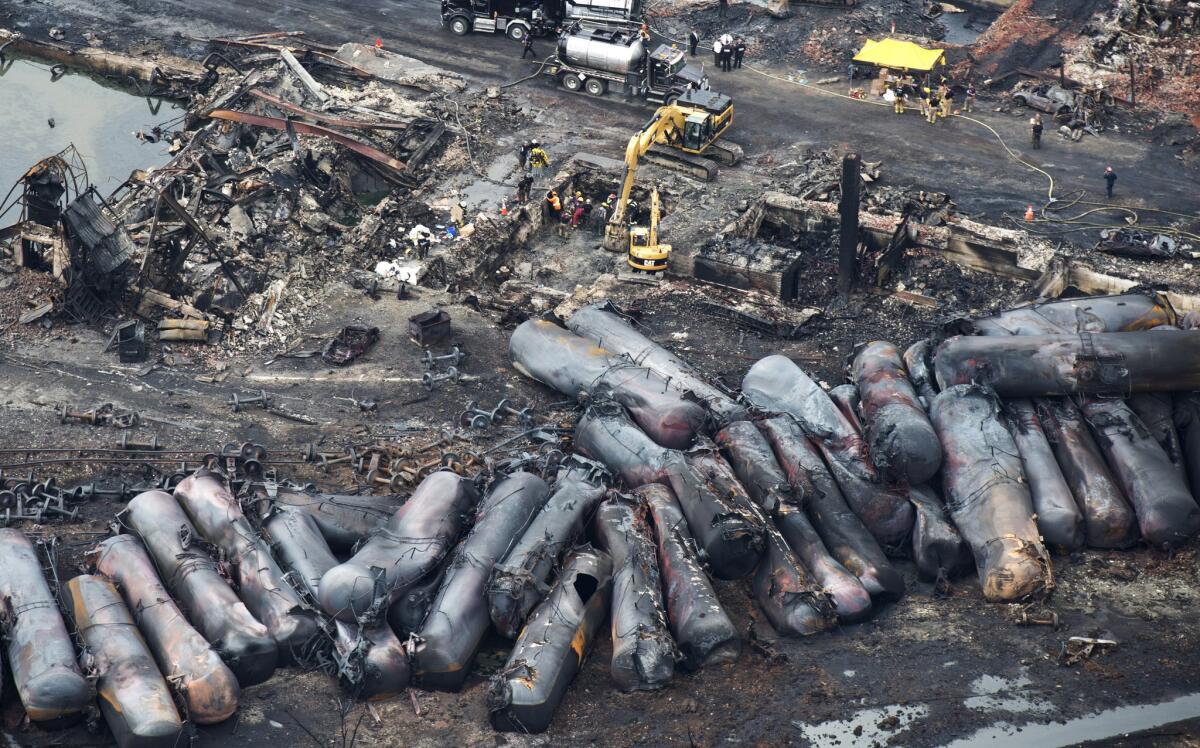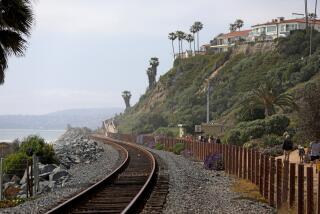Rail firm in deadly Quebec blast barred from operating in Canada

Canadian transportation officials Tuesday suspended the operating license of the regional railway company whose unmanned train broke loose from a Quebec siding last month and ignited a massive fireball that killed 47 people and devastated the town of Lac-Megantic.
The Canadian Transportation Agency action will bar Montreal, Maine & Atlantic Railway from further movement on Canadian rails beginning Aug. 20.
The suspension was ordered because the CTA, a Canadian federal agency that acts as an independent regulator, said MMA had insufficient insurance and was unable to afford to buy it, given its already massive debt even before calculating potential liabilities from the July 6 disaster.
The MMA locomotive and its train of 73 crude-oil-laden tankers had been parked and left unattended at a siding seven miles uphill from Lac Megantic minutes before it began rolling, according to initial reports from the disaster investigation.
Investigators have yet to determine whether the train’s brakes were properly set by the engineer who left the train for what was to have been an overnight stop. The inquiry is also looking into whether a reported boarding by firefighters to extinguish a small fire might have caused or contributed to the train slipping its brakes and careening seven miles downhill until it derailed in the center of Lac-Megantic. All but one of the tankers derailed, igniting a fireball that incinerated entire blocks of the town center, including a popular bar crowded with Saturday night patrons.
The rail company, which also operates in New England, was given “full and fair opportunity to demonstrate that they have secured adequate third-party liability insurance coverage for their ongoing operations, which is a legislative requirement to operate a railway in Canada,” said CTA Chairman Geoff Hare in a statement posted on the agency’s website.
“This was not a decision made lightly, as it affects the economies of communities along the railway, employees of MMA and MMAC [the Canadian affiliate], as well as the shippers who depend on rail services,” the statement said of the license suspension. But, Hare’s statement added, “it would not be prudent, given the risks associated with rail operations,” to permit the company to continue operating without adequate insurance.
MMA owns 510 miles of track in Maine, Vermont and Quebec and employs about 170 people, according to the company website profile. It runs 15 trains a day of privately owned cargo and fuel containers pulled by its fleet of 26 locomotives.
The company also plays a wider role in the North American transport network, as it provides a vital link with strategic hubs such as Montreal for shipments between the Northeast and the U.S. and Canadian West. The train that crashed in Lac-Megantic, for instance, was carrying crude oil from the Bakken fields in North Dakota destined for a refinery in St. John, New Brunswick.
The Canadian suspension doesn’t directly apply to MMA’s routes through the United States, which are under the legal jurisdiction of Maine’s transportation authorities. But the halt ordered on all Canadian segments of the railway is expected to disrupt the company’s service to the U.S. state.
The CTA statement also announced that a nationwide review would be conducted to assess the adequacy of other Canadian rail operators’ insurance and their ability to cover losses in the event of a catastrophe.
MMA filed for bankruptcy last week in both Maine and Canada, and was granted protection from creditors. The company reported in its Chapter 11 filing that it had $18 million in assets and $48 million in liabilities, not including potential claims from the Lac-Megantic disaster.
The rail company had been overseeing cleanup of the site until the court decision to grant it protection from creditors. The government has since transferred responsibility for the cleanup, estimated to exceed $200 million, to a private company.
MMA’s bankruptcy filings disclosed that the company has about $24 million in third-party insurance coverage.
ALSO:
Egyptian police clash anew with Morsi supporters
Israel approves more settlement construction ahead of talks
West largely rejecting calls for Olympic boycott over Russia anti-gay law
Twitter: @cjwilliamslat
More to Read
Sign up for Essential California
The most important California stories and recommendations in your inbox every morning.
You may occasionally receive promotional content from the Los Angeles Times.











